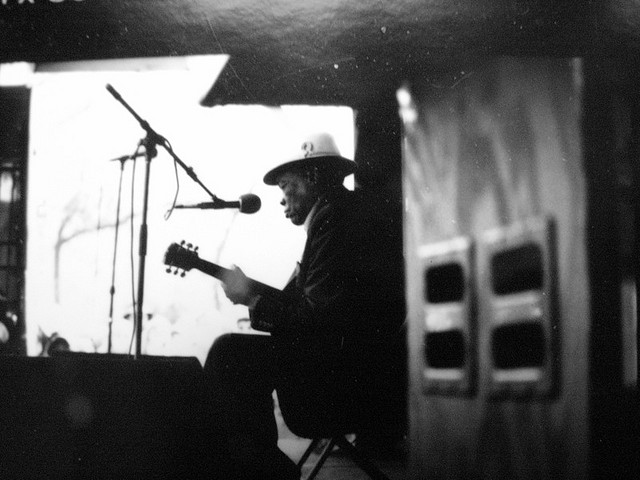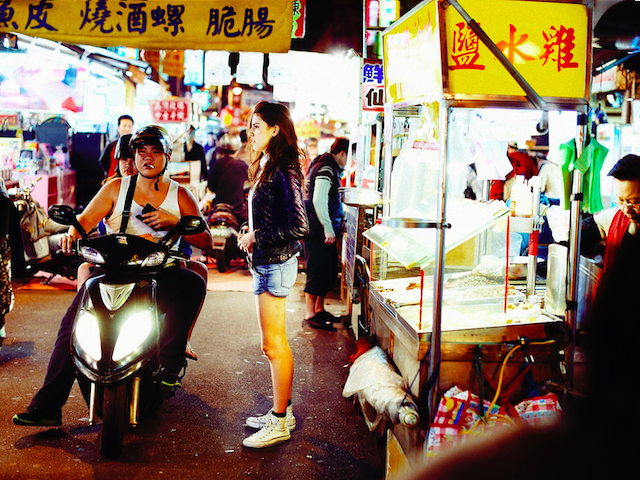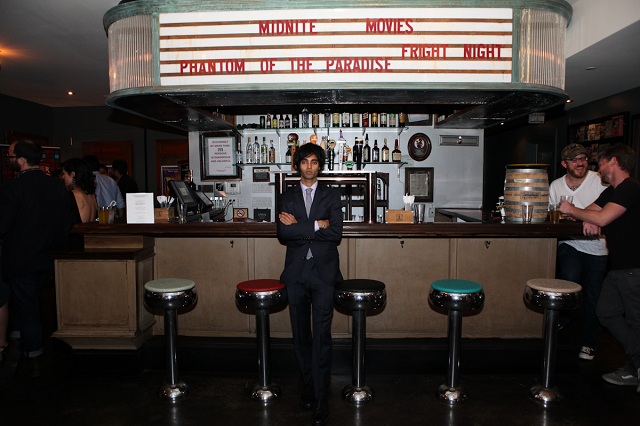Crown Heights-based activist DJ Ushka talks about growing up in Thailand, gentrification, global bass, and Edward Said.
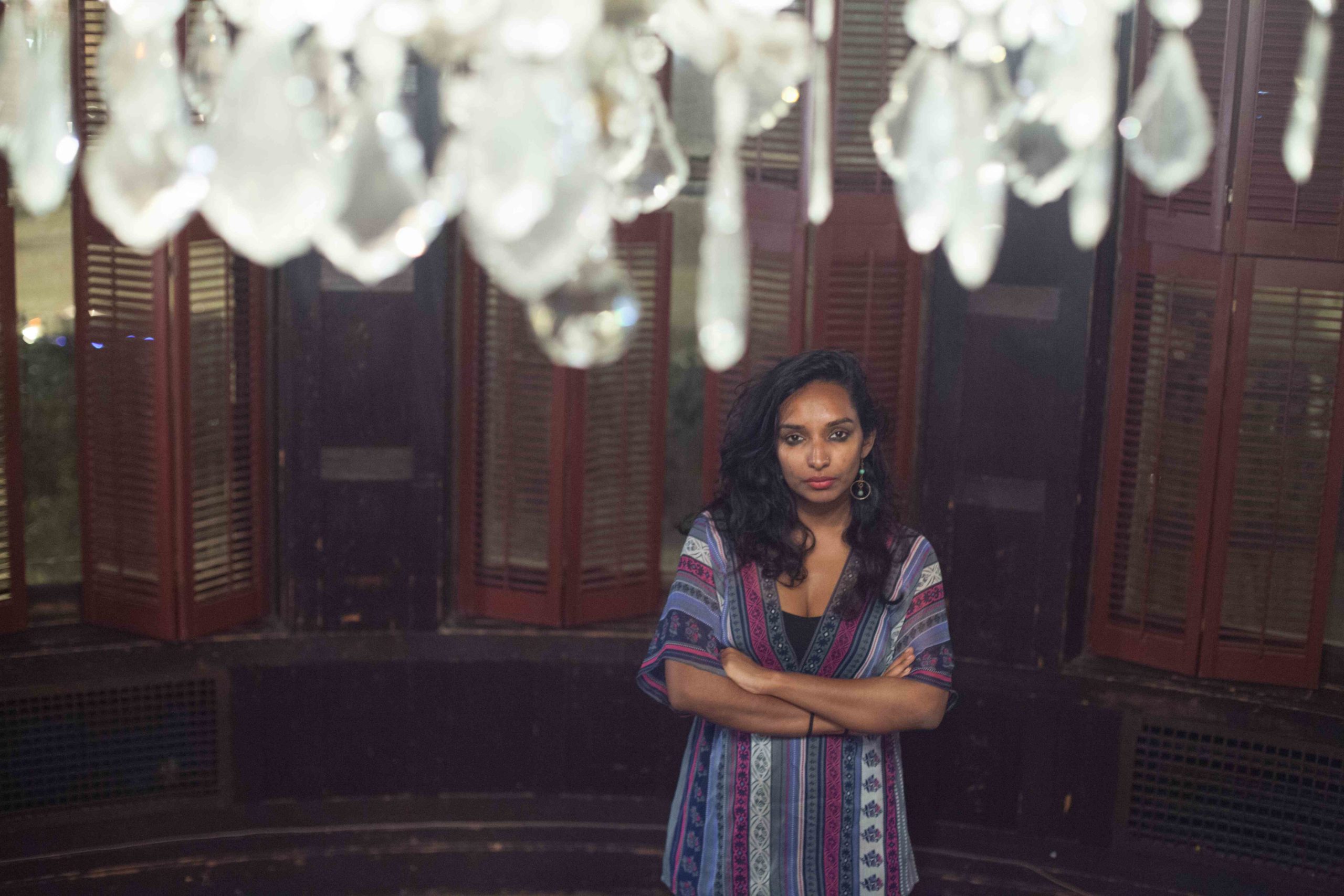
February 26, 2014
[Editor’s Note: This is Open City’s second installment of “Lyrics To Go,” a collaboration between writer Rishi Nath and multimedia journalist Nabil Rahman. The series features conversations with contemporary musicians whose life and work intersects both Asian-American communities and New York City neighborhoods. Click here for DJ Ushka’s special mix for Open City readers.]
These days, DJ Ushka seems to be everywhere at once. She is all over Brooklyn, whether opening for Sundanese vocalist Alsarah in Stuyvesant Heights, deejaying and booking the monthly iBomba party in Williamsburg, or swooping in to save the AAWW PageTurner Festival party after a booked act canceled last minute. She also zig-zags the country, appearing at gigs in Boston, Philadelphia and Oakland. And that’s just weekends. During the day, she is a full-time staff member at the New York Immigration Coalition, where she handles communications and youth development.
Born Thanu Yakupitiyage, in Colombo, Sri Lanka, Ushka grew up in Bangkok, Thailand. She attended college in western Massachusetts, where she was turned on to post-colonial theory. From her spacious, dimly lit living room in Crown Heights, she described how that experience, a decade ago, changed her.
“It was the first time that I really started to understand concepts such as Orientalism, through Edward Said,” she said. Her laptop, attached to speakers and headphones, was open and glowing on the coffee table in front of her as she spoke. A poster proclaiming “Stop Racial Profiling,” hung on the wall behind her.
It was a South Asian woman named Pari who first pulled Ushka into the club scene. “When I first saw her in college dancing she would have such eye contact with people and just bring people in–and she was the one who would just take me everywhere. Whether it was a college party or a club in New York, or wherever we were, her ability to interact with complete strangers was what did it for me,” she recalled. After graduating, Ushka stayed on in the States and moved to Brooklyn.
A little more than two years ago, after graduate school, Ushka became serious about deejaying. She told WNYU’s DJ Petra: “My trajectory into deejaying came from…being on the floor and being like ‘I can do that…’”. And, while she had been organizing with Dutty Artz, a popular deejay collective and record label, it wasn’t until August of 2012, at a fundraiser called Change The Mood, that the crew took note of her musical skills. “We all found out how wicked of a DJ Thanu was,” cultural critic, deejay, producer and Dutty Artz CEO Chief Boima wrote.
Demand for her work has grown, in large part, through the popularity of two mix tapes–Foreign Brown and What Edward Said–both subsequently released on the Dutty Artz record label. The mixes, featuring Ushka’s signature blend of carefully chosen uptempo tracks and remixes culled from across the Global South, have been downloaded several thousand times. She was recently included in a 2013 list of favorite female deejays by Thump, the new electronic music channel from Vice.
Her music choices as well as her identity as a deejay reflect a radical politics. Last November, when a Brooklyn rave party employed racist language in its advertising materials, Ushka tweeted about it, demanded that the flier be taken down. She went on to remind her peers: “as deejays, particularly in the global music scene, we should be questioning event organizers in their planning/execution.”
DJ Ushka spoke to Lyrics To Go, about growing up in Thailand, the racial and economic dynamics of Crown Heights, how she creates mixes, and getting her start as a deejay.
What was it like growing up in Thailand as a South Asian?
Growing up as a dark skinned person in Southeast Asia is like one of the most difficult things in the world—like, straight up.
I grew up being told that I would not amount to anything. I grew up being told I was ugly. I grew up being told that if I had been a little bit lighter maybe things would have been different for me. That was like the everyday. And of course, it would come out in the very subtle ways in which internalized racism comes out, in the ways by which colorism is such a thing in Asia. So that was always really difficult, particularly in Thailand where I was one of the darker people in my classes.
My father always said, “I grew you up without a country.” I feel proud of being Sri Lankan, and proud of being in New York—what I’ve built here; its all part of what it means to have a global identity.
Ironically, at this international school in Thailand, all of my teachers were white. It was like neo-colonialism in the making. I was taught Joseph Conrad’s Heart of Darkness but never was taught, never discussed, the racism.
Do you identify as an Asian-American?
I don’t identify as Asian-American. I identify as an immigrant in the U.S., as a global citizen. It sounds corny, but my father always said “I grew you up without a country.” I feel proud of being Sri Lankan, and proud of being in New York—what I’ve built here; its all part of what it means to have a global identity.
What were your experiences when you first came to the States?
When I first came to the States a lot of people were like, “Oh how do you know English,” and, “Why don’t you have an accent?” I was like, “What do you mean? Y’all have accents, I have an accent too.” But what they meant was like that I didn’t sound like I was Sri Lankan, I didn’t sound like I was from Asia, whatever that meant to them.
When did you first come to New York?
I remember coming to New York, I don’t remember the parties, but a lot of the Queer parties, like a lot of the Vogue-ing, the ballroom scene, really stood out to me. It was all in Manhattan.
You live in Crown Heights, where populations are rapidly changing. Given your previous experiences how do you see your current situation?
When I first moved to NYC I lived in Kensington, which is very South Asian. After that, the majority of my seven years in New York I have lived in Crown Heights: the boundaries are interesting—I first lived on Park Place between Washington and Classon, now considered Prospect Heights, and extremely gentrified now—where I live now is deeper in the neighborhood and more Trinidadian and Guyanese.
The thing about Brooklyn is how immigrant communities stake claim to space but also how quickly that stake can be taken away by development. You can see that on my block. It’s the ways in which capitalism alienates people. When Brooklyn was neglected, it wasn’t considered a place that people wanted to move to; that’s when West Indian and immigrant communities could stake claim. When the neighborhood rises in value, belonging gets taken away.
Nothing is stable; everything is shifting. Foreignness keeps shifting.
I’m very conscious of not being from here, but because I have a full-time job, being able to afford my apartment. When we moved in three years ago, we were some of the only non-black, non-West Indian folk moving in. I’m seeing older folks move away. And it’s mostly been white folks since.
Because I’m dark skinned, and because I sort of keep my mouth shut, I often pass for Trinidadian: people just assume that. My experience has been good; people in my neighborhood have my back. It’s about how you treat your neighbors. Different people who feel foreign for different reasons, alienated for different reasons, are able to band together.
For example, I was just having a conversation with a gym owner down the block. He’s Trinidadian, he grew up playing cricket, and knows where Sri Lanka is—all of these cultural connections. So even though he has lived here for 25 years, his understanding of my foreignness allows him to bring me in.
How did you begin deejaying?
I think just out of a feeling that it was something that I could do. I was often up for dancing, I’m a dancer, I was always just vibing on the dance floor. I saw that deejaying was something a lot of men do, and I just thought I could do it too.
Dancing for me is like a way of meeting people. I have met a lot of incredible people on dance floors. To me dance floors are like sacred spaces. They are organizing spaces. Me, coming from a background of being an organizer—being involved in immigrant justice work, racial justice work–I see those things as connected.
Dancing for me is like a way of meeting people. I have met a lot of incredible people on dance floors. To me dance floors are like sacred spaces. They are organizing spaces.
When I started deejaying, I was in grad-school, three years ago, and I was just in a place of sadness. I was dealing with different things in my life and music was sort of a way to get away from that but also to explore it all in a different way. So coming into deejaying was a mode for me to deal with sadness but then in the end became a beautiful way to express happiness.
You play what is known as “Global Bass,” but you’ve been critical of that term.
The whole concept of Global Bass is really an umbrella term that was created because nobody knew how to really understand this idea of playing music from everywhere. So Global Bass became this whole thing where the backbeat is the bass but the music is from everywhere. But, it’s limiting, because it sort of becomes this false melting pot of all of this music. That’s definitely not what I’m interested in and it’s definitely not what folks I deejay with are interested in. I think that there is a way in which you can genre-blend, where you are very aware of the music that you are playing, so that it’s not about taste-testing but connecting, and that’s what I’m interesting in doing.
How long did it take you to pick up the mixing?
It took a lot of practice. I don’t think I was initially good at it. It is very difficult, particularly when you’re dealing with lots of different kinds of music. Just trying to beat-match a Bhangra song and then a Soca song, and then like a West African song, it is really difficult. It requires really an understanding of bass beats and how different kinds of music connect.
For example, a lot of West African music connects with Champeta from Columbia, so they have similar beats. So that’s how you could blend from one song into the other. A lot of Soca and Soca-Chutney are connected to South Asian music, so that’s how you can blend Bhangra into Soca-Chutney. I think a mix of knowing the histories of the music, knowing the trajectories of the migration of that music really helps to beat match, but also I deejay with my hips. Seriously, that’s really what it was.
I think some deejays are technically skilled and for me the technique is something I’m still learning–but I can tell what sounds good because I am always dancing. I am always dancing in my head, I am always dancing with my hips, I am always tapping my foot. That’s why some of the best DJs are dancers because you can sense it in a very different way and that really helps with the genre blending.
I think a mix of knowing the histories of the music, knowing the trajectories of the migration of that music really helps to beat match, but also I deejay with my hips.
What is your opinion on how digital music has changed deejay culture?
The digitizing of music files has democratized the ability to deejay. I know there are still a lot vinyl-heads will say, “That’s not really deejaying.” I respect that. I love vinyl. I have respect for the people who deejay on the vinyl, but I didn’t have those means. I didn’t have the means to collect like 15,000 records. I couldn’t afford turntables for a really long time. This was a different way in which I learned to deejay, and that doesn’t mean that I still don’t have things to learn, but also, separate from that, there’s a lot of global music that’s not on vinyl. Straight up.
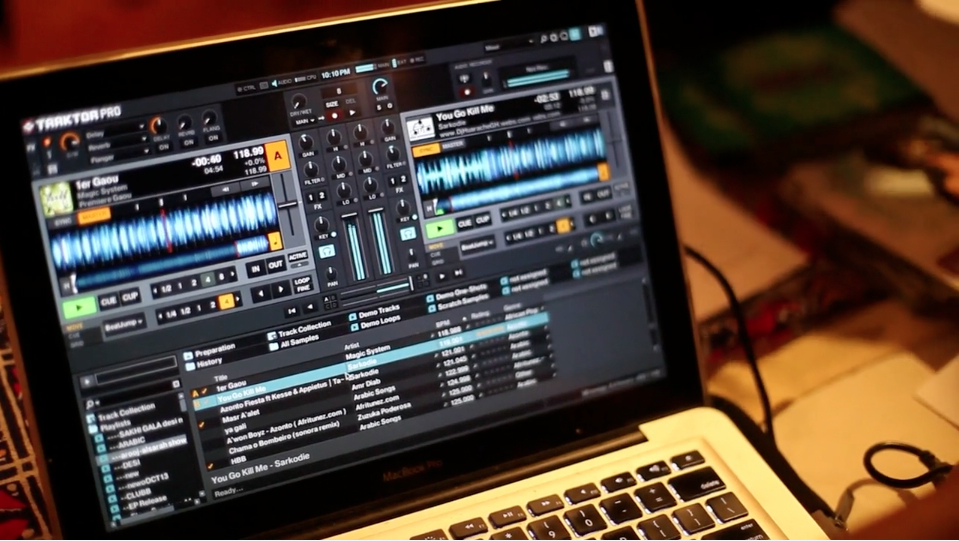
Do you feel that music connects communities? Or do you feel like the way music is organized in New York reinforces existing divisions?
There are ways in which people may play global music, but are doing so for particular scenes. I would say Dutty Artz ends up falling into that, categorically, because its about who you can outreach too. I do feel like Dutty Artz has a base across the board of young American, hipster audiences, and also like African and Latin American audiences.
I play a lot of music that the community that I live in might listen to, but I’m playing it at Bembe (81 S. 6th Street) in South Williamsburg and it has an immigrant crowd, but people from Crown Heights are not necessarily going to go to Bembe.
It’s about the responsibility of being in the arts world and how do you want to contribute to your community. We tried to do a festival called Beyond The Block. I would love to deejay a block party in Crown Heights…I just don’t know if its my place, I would do it if it was connected with someone in the neighborhood who is doing it.
What about the new venues on Nostrand Avenue?
One new bar that opened up within the last two years was NoBar, and a lot of the black community was going there. And now this new bar, Nostrand Pub has opened up, which is for a whole different group of people.
There doesn’t have to be a ‘whites only’ sign bar for people to know its not for them. There is a liquor store across the street where all these very lonesome people hangout. They have every right to go in there but would never dare to come in.
One new bar that opened up within the last two years was NoBar, on Nostrand Ave, and a lot of the black community was going there. And this new bar, Nostrand Pub has opened up, which is for a whole different group of people.
Oppression is deliberate but it’s also sneaky. It’s like a silent culture of rejecting people of color.
So the immigrant rights work is more of an entry point to the neighborhood for you?
Being undocumented is still a taboo. There are actually a lot of undocumented in East Asian, South Asian and Caribbean communities. But people don’t talk about it. Just keep your head down and don’t talk about it. I gave a presentation for a women’s organization—Grenadian and Bajan women—in the Flatbush/Crown Heights area: it was interesting for people to have someone come in, a young brown woman, who is clearly a post-colonial subject.
It provides an entry point, to talk about their issues. I don’t see myself separate from that work. The work in immigrant rights that I do is both deeply personal and impacts the people around me, my neighbors. It’s a point of mutual understanding.
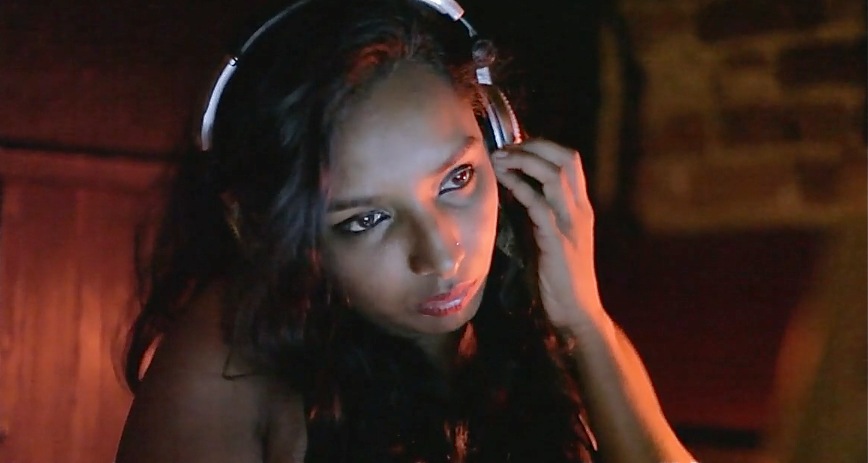
Can you talk about how music and politics meld in your mixtapes?
The title “Foreign Brown” came out of a conversation I was having with my friend Mariana, a Venezuelan artist who goes by MPeach, and we were talking about citizenship—she’s a Venezuelan citizen, I’m a Sri Lankan citizen—and how we’ve been in the States for like hell-a-long! It’s very difficult for me to go home. I need a tourist visa to go home. So I said to her, “Man, it’s like being foreign-brown no matter where you go.” That’s where the title came from. We both were like, “Oh my god, that should be a mixtape title!”
“Foreign Brown” is really eclectic. It starts with a song about La Migra, about immigration custom enforcement, it was made by a friend, Lido Pimienta, a Columbian vocalist living in Toronto. I really wanted to connect my politics, themes of migration, to other themes including colorism, alienation, immigration, but also just make a fun mixtape to dance to.
More recently I released “What Edward Said.” with Brooklyn Shanti. We produced a song, “Hanuma Vannama,” a remix of a Sri Lankan traditional dance song, a folkloric dance song. That was one of a series of six EPs for Dutty Artz’s sixth year anniversary. That particular EP is sort of a geographic connecting of the dots between South East Asia, South Asia, parts of the Middle East and Maghreb, in North Africa. It starts with Sarama music, which is basically, for folks who know Muay Thai, which is a boxing ritual. That’s how “What Edward Said” starts with, in some ways, a call to fight.
Right now I’m thinking of another mix. I really am interested in a mix as sort of a whole project, so it’s not just about the music for me, but very much about the cover art, very much about the title, and that I think really helps to explain subtly the narrative in which you are trying to make through your music.
You’ve had a remarkably fast rise as a deejay. How would you describe your followers?
I don’t really know who follows me. I don’t think that anything I put into the world I do it for people I don’t know. I think I very much do it for people who do know me. So if I am making a mix, I am thinking about the forty to fifty people who do know me intimately, who do know my history, who do know my story. Everyone else can think of me like, “Ooo this girl from Sri Lanka who grew up in Thailand.” But then people who know me and think and see me as this immigrant girl who runs some of the organizing in New York and thinks about music and thinks about how to put that stuff on the dance floor, and that’s the audience I know and they are who I put my things out for.
I don’t think that even people who follow me necessarily completely understands the whole picture. But then like what person who follows anyone does? You will always pull from the things that you think are interesting, and then, as an artist grows, and that following continues to be there, only then, does the individual really get to know the artist.
DJ Ushka spins every second Thursday of the month at the iBomba party @ Bembe, 81 S. 6th Street, Brooklyn.

